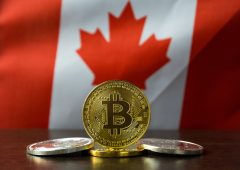Jamie Dimon Labels Bitcoin a Tool for Crime While JPMorgan Profits from Crypto
14.01.2025 17:30 1 min. read Alexander Zdravkov
JPMorgan Chase CEO Jamie Dimon continues to criticize Bitcoin, reiterating his view that the cryptocurrency lacks any inherent value.
In a recent interview with CBS News, Dimon stated, “Bitcoin has no intrinsic value. It’s frequently tied to activities like money laundering, ransomware, and trafficking, which makes me skeptical.”
Unlike BlackRock’s Larry Fink, who shifted to a pro-Bitcoin stance, Dimon remains unwavering in his criticism, even as JPMorgan capitalizes on crypto’s expansion. The bank plays a role in BlackRock’s spot Bitcoin ETF, highlighting its business pragmatism despite Dimon’s personal reservations.
At the same time, JPMorgan is leaning into blockchain technology. It recently rebranded its Onyx platform to Kinexys to focus on tokenizing real-world assets (RWA) and addressing inefficiencies in the financial system. Plans include launching on-chain foreign exchange services by early 2025.
READ MORE:

BlackRock Expands Bitcoin ETF to Canada
Dimon’s comments come as the incoming Trump administration signals plans for a more favorable regulatory environment for Bitcoin and crypto, which could reshape the industry. While Dimon’s skepticism persists, the broader market continues to embrace blockchain innovations, with JPMorgan adapting to the changing financial landscape despite its CEO’s critical stance.
-
1
Peter Schiff Warns of Dollar Collapse, Questions Bitcoin Scarcity Model
12.07.2025 20:00 1 min. read -
2
Corporate Bitcoin Adoption Soars: 125 Public Companies Now Hold BTC
16.07.2025 20:00 2 min. read -
3
Bitcoin ETFs See $1B Inflow as IBIT Smashes Global AUM record
11.07.2025 21:00 1 min. read -
4
Bitcoin Reaches $119,000 Milestone as Corporate Demand and ETF Inflows Rise
13.07.2025 17:45 2 min. read -
5
Bitcoin Price Prediction From Bernstein After the Recent All-Time High
14.07.2025 20:00 1 min. read
Where Is The Smart Entry Point For Bitcoin Bulls?
With Bitcoin hovering near $119,000, traders are weighing their next move carefully. The question dominating the market now is simple: Buy the dip or wait for a cleaner setup?
Matrixport Warns of Bitcoin Dip After Hitting This Target
Bitcoin has officially reached the $116,000 milestone, a level previously forecasted by crypto services firm Matrixport using its proprietary seasonal modeling.
Bitcoin Risk Cycle Flips Again as Market Enters Safer Zone
Bitcoin’s market signal has officially shifted back into a low-risk phase, according to a new chart shared by Bitcoin Vector in collaboration with Glassnode and Swissblock.
Robert Kiyosaki Warns of 1929-Style Crash, Urges Bitcoin Hedge
Financial author Robert Kiyosaki is once again sounding the alarm on America’s economic health.
-
1
Peter Schiff Warns of Dollar Collapse, Questions Bitcoin Scarcity Model
12.07.2025 20:00 1 min. read -
2
Corporate Bitcoin Adoption Soars: 125 Public Companies Now Hold BTC
16.07.2025 20:00 2 min. read -
3
Bitcoin ETFs See $1B Inflow as IBIT Smashes Global AUM record
11.07.2025 21:00 1 min. read -
4
Bitcoin Reaches $119,000 Milestone as Corporate Demand and ETF Inflows Rise
13.07.2025 17:45 2 min. read -
5
Bitcoin Price Prediction From Bernstein After the Recent All-Time High
14.07.2025 20:00 1 min. read

